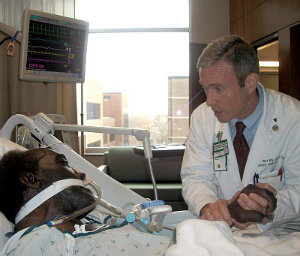 Dr. Wes Ely tests a patient for ICU delirium. Click on the photo to listen to or read a Nashville NPR report on Dr. Ely's study on ICUs and delirium.
Dr. Wes Ely tests a patient for ICU delirium. Click on the photo to listen to or read a Nashville NPR report on Dr. Ely's study on ICUs and delirium.Going to the hospital can be scary, especially if it’s for a critical illness. Unfortunately, it turns out we have even more to be worried about -- long-term cognitive problems.
An important study was published earlier this month showing that going to the intensive care unit ICU) can do new and lasting damage to the brain. And delirium, a potentially preventable state of confusion that too often occurs in the hospital, plays a major role in having worse outcomes.
Imagine the very “real world” consequences—problems balancing a checkbook, finding a parked car, or following a simple recipe, all as a result of hospitalization a year earlier. Even worse, among older adults cognitive decline is associated with institutionalization, further hospitalization, and considerable societal costs. We have a major public health issue on our hands.
This all points to why we need better ways of delivering care to older adults that prevent or diminish delirium in the hospital and better models of health care delivery throughout our health system.
Last week, Amy Berman introduced our Models of Care funding area (part of a series of introductory posts to the John A. Hartford Foundation’s new strategies) and made the case for our continuing to invest in the development and spread of evidence-based models. We will focus on interventions that span our delivery system, and in fact, we’ll emphasize effective primary care for older adults and linking to community-based services.
But studies like the one conducted by Beeson Scholar Wes Ely MD—who continues to have a particular passion for the care of older critically ill patients—and collaborators at Vanderbilt University School of Medicine show us that better models will be needed across the continuum of care, including in hospitals and ICUs.
Publishing in the New England Journal of Medicine, the Vanderbilt group looked at a large sample of ICU patients and found that a full year after discharge from the intensive care unit, 25 percent of patients had brain function problems very similar to mild Alzheimer’s disease, even though only 6 percent had cognitive impairment before.
One in three patients had cognitive problems a year later similar in severity to moderate traumatic brain injury. Seventy percent of patients in the study experienced delirium, and those who had longer delirium episodes had significantly worse long-term cognitive outcomes, independent of other variables.
Even with limitations inherent to studies like these, an accompanying editorial in the journal noted the scientific rigor of the research and declared: “The public health effect of neurocognitive morbidity after critical illness is undeniable.”
Fortunately, Dr. Ely and the ICU Delirium and Cognitive Impairment Study Group at Vanderbilt are also working on solutions to this problem. They have developed a standard bundle of ICU measures that they believe can “help standardize communication, improve interdisciplinary patient care, reduce mortality, and improve long-term cognitive and functional outcomes.” For example, research has found early mobilization—getting ICU patients up and moving—is safe and effective at reducing days of delirium.
Mobility is an essential component of the Hospital Elder Life Program (HELP) developed by Dr. Sharon Inouye to help reduce delirium across the hospital, in all of its units. The evidence-based model uses both staff and trained volunteers to deliver a set of interventions and involves interdisciplinary geriatric team care as well as community linkages and telephone follow-up.
Dr. Inouye is currently co-chairing an expert panel with another Beeson Scholar (and a surgeon and delirium expert), Dr. Tom Robinson, that will develop best practice guidelines for surgeons, anesthesiologists, and other related specialists on the prevention and management of delirium from their specialty perspectives. The Hartford Foundation is funding this work through our Geriatrics for Specialists Initiative at the American Geriatrics Society.
We know that this is a topic of particular interest to readers of the Health AGEnda blog. More than two years after it was written, Nora OBrien-Suric’s Confused About Post-Operative Confusion continues to be one of the most-read posts. From the responses we’ve received to Nora’s post, we understand the pain and heartbreak delirium causes not just for older adults, but for their loved ones as well.
Thankfully, we have geriatric care experts like Drs. Ely, Inouye, and Robinson translating their research into practice to reduce the risk of delirium and minimize its devastating impacts. We look forward to supporting others like them who are developing evidence-based models that deliver high-value, high-quality care to older adults in all health care settings.
